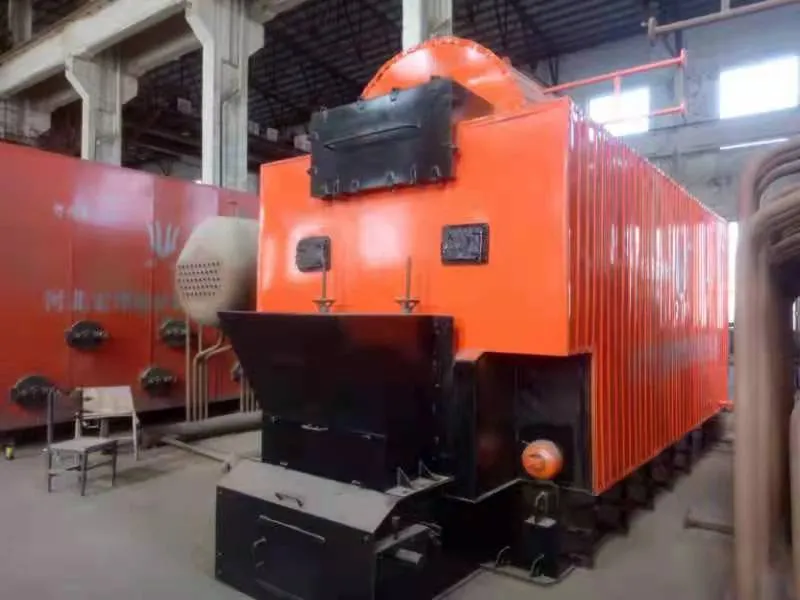
Dec . 21, 2024 08:36 Back to list
Understanding the Operation of a Thermal Fluid Boiler for Efficient Heating Solutions
Understanding the Working of a Thermic Fluid Boiler
A thermic fluid boiler is a specialized apparatus that uses a unique heat transfer fluid to efficiently transfer thermal energy for various industrial processes. Unlike traditional steam boilers, which convert water into steam to transfer heat, thermic fluid boilers utilize organic heat transfer fluids that can operate at higher temperatures and lower pressures. This article explores the working principle, components, advantages, and applications of thermic fluid boilers.
Working Principle
The primary function of a thermic fluid boiler is to generate heat by circulating a thermic fluid that absorbs thermal energy. The process begins with the heating of the fluid, which is typically a synthetic oil or organic fluid designed to withstand high temperatures without breaking down. The boiler consists of a heating chamber where fuel (such as natural gas, diesel, or biomass) is combusted, generating heat.
As the combustion process takes place, the heat produced is transferred to the heat transfer fluid circulating through the system. The fluid absorbs this heat and increases in temperature while passing through the heating chamber. Once heated, the fluid is pumped through a series of heat exchangers where it transfers thermal energy to the targeted processes, such as heating equipment, drying systems, or other industrial applications.
After transferring heat, the cooled thermic fluid returns to the boiler to be reheated, creating a continuous loop. This closed-loop system ensures efficient heat transfer and minimizes energy loss.
Components of a Thermic Fluid Boiler
A thermic fluid boiler consists of several key components that work together to ensure efficient operation
1. Combustion chamber This is where the fuel is burned to generate heat. The design of the chamber ensures complete combustion, maximizing efficiency.
2. Heat transfer fluid This specialized fluid is designed for high-temperature operations. Common options include synthetic heat transfer oils and organic fluids that offer excellent thermal stability.
3. Pump The pump circulates the thermic fluid throughout the system, ensuring consistent flow and pressure.
thermic fluid boiler working

5. Control systems Modern thermic fluid boilers are equipped with advanced control systems that monitor temperature, pressure, and flow rates, allowing for precise regulation of the heating process.
Advantages of Thermic Fluid Boilers
Thermic fluid boilers offer numerous benefits over traditional steam boilers, making them increasingly popular in various industries
1. High efficiency These boilers can operate at higher temperatures without the risks associated with high-pressure steam systems, leading to improved energy efficiency.
2. Reduced energy consumption By minimizing thermal energy losses and maximizing heat transfer, thermic fluid boilers help reduce overall energy consumption.
3. Lower maintenance costs The absence of steam-related components results in less wear and tear, reducing maintenance requirements and costs.
4. Versatility Thermic fluid boilers can support a wide range of industrial applications, including chemical processing, food production, textiles, and more.
5. Improved safety Operating under lower pressures eliminates the risks associated with high-pressure steam systems, enhancing workplace safety.
Applications
Thermic fluid boilers are employed in various industries where efficient and consistent heat transfer is essential. Common applications include
- Chemical manufacturing Used for maintaining reaction temperatures and product drying processes. - Food processing Employed in cooking, drying, and sterilizing processes. - Textiles Used for drying fabrics and dyeing processes. - Plastics and rubber Utilized for thermoregulation during production processes.
In conclusion, thermic fluid boilers are a reliable and efficient option for industrial heating applications. With their unique design and efficient thermal transfer capabilities, they are well-suited for many sectors, supporting various processes while ensuring safety and sustainability. As industries continue to seek energy-efficient solutions, the role of thermic fluid boilers is likely to grow significantly.
-
Oil Fired Hot Water Boilers Sale - High Efficiency & Affordable
NewsJul.31,2025
-
High-Efficiency Commercial Oil Fired Steam Boiler for Industry
NewsJul.30,2025
-
High-Efficiency Biomass Fired Thermal Oil Boiler Solutions
NewsJul.30,2025
-
High Efficiency Gas Fired Thermal Oil Boiler for Industrial Heating
NewsJul.29,2025
-
High-Efficiency Gas Fired Hot Water Boiler for Sale – Reliable & Affordable
NewsJul.29,2025
-
High Efficiency Biomass Fired Hot Water Boiler for Industrial and Commercial Use
NewsJul.29,2025
Related PRODUCTS






















